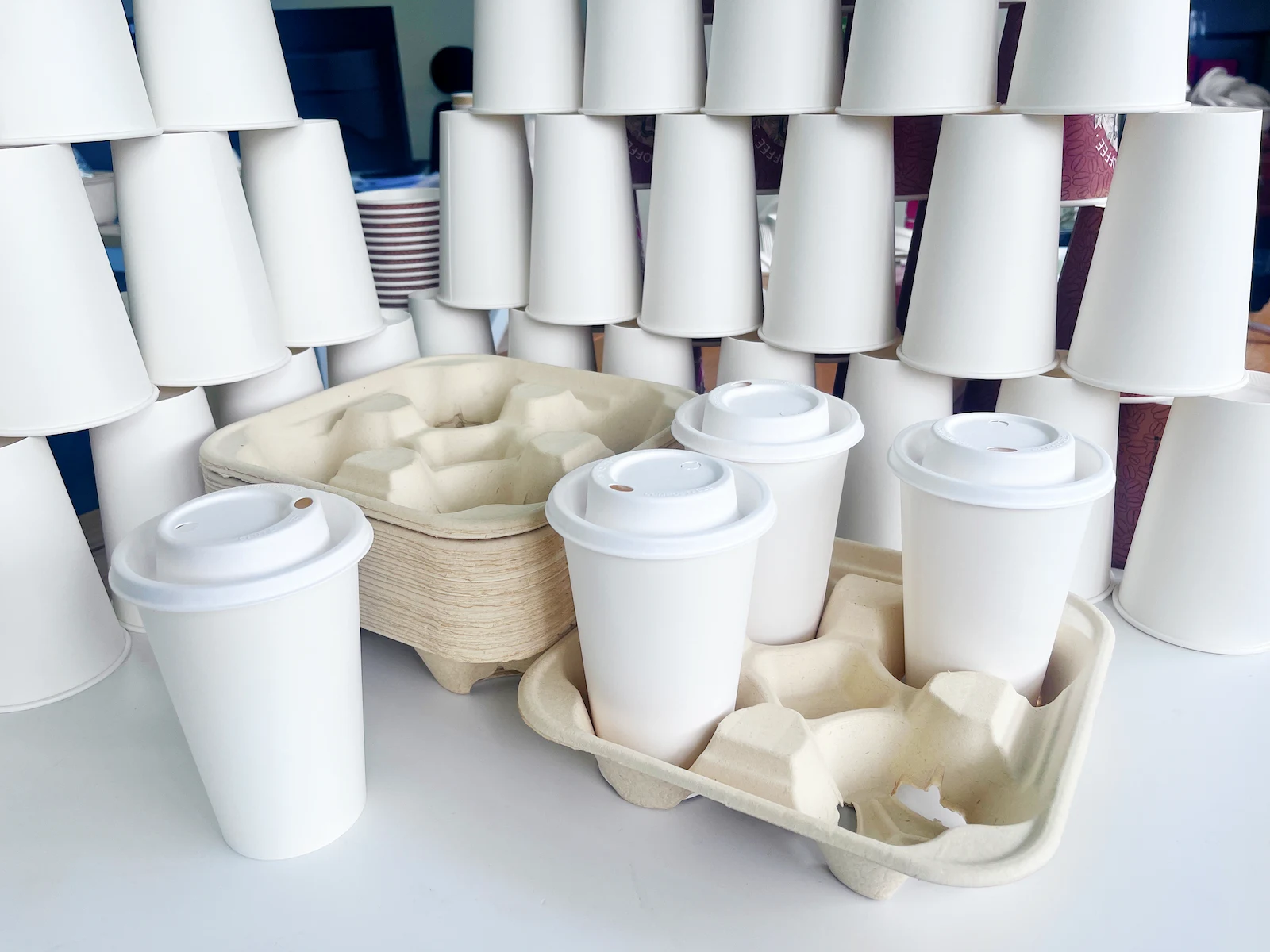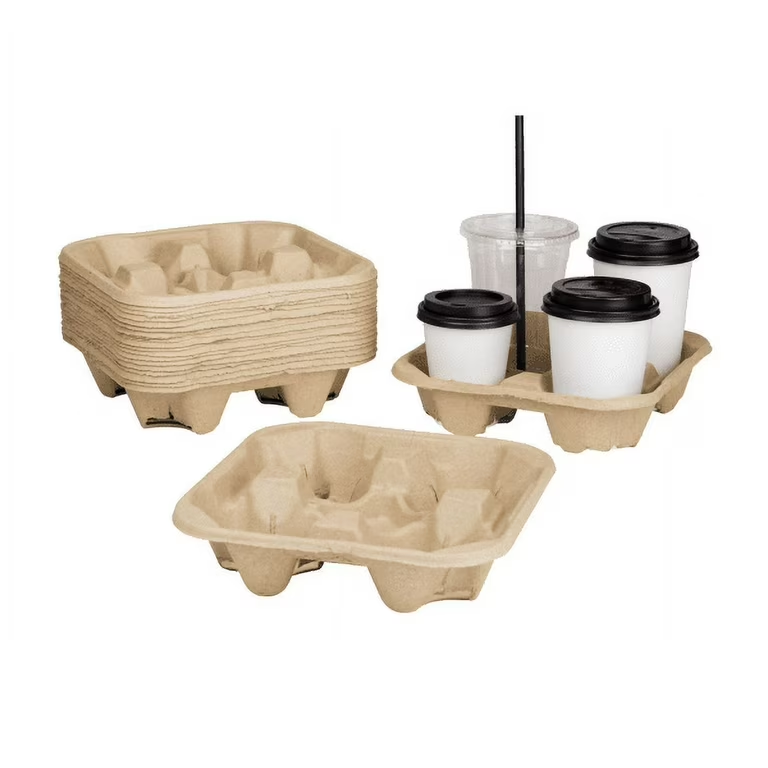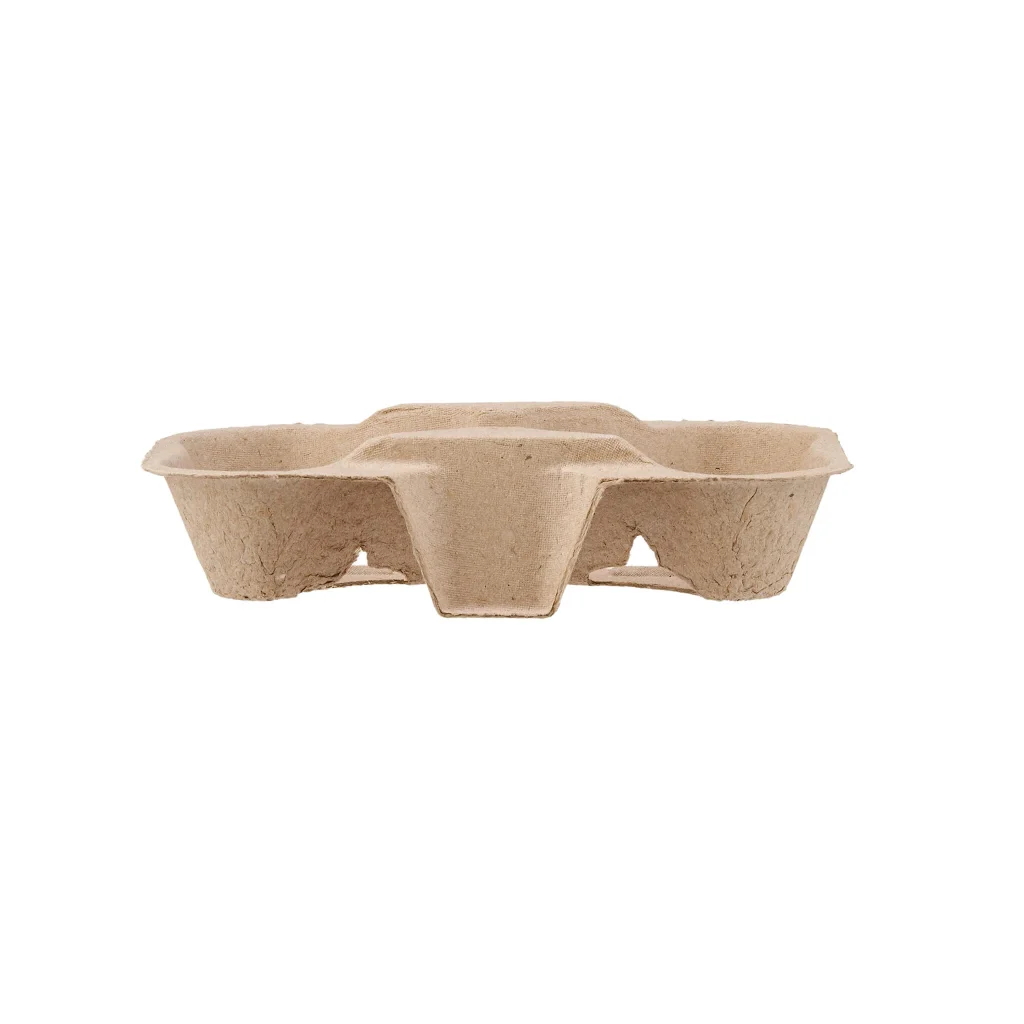Contents
The scourge of single-use plastics has reached a tipping point, compelling businesses and consumers alike to seek eco-friendly alternatives. Among the myriad of disposable items, drink carriers and trays remain ubiquitous culprits, clogging waterways and landfills with non-biodegradable waste. Enter recycled pulp Cup Holders, a sustainable solution engineered to replace plastic counterparts without compromising on performance or aesthetics.
These molded fiber products, crafted from post-consumer paper and cardboard, offer the same structural integrity needed to securely transport beverages—be they hot coffees, iced teas, or fizzy sodas—while ensuring a minimal environmental footprint.
In this comprehensive guide, we explore the pivotal reasons for ditching plastic, the intrinsic advantages of recycled pulp Cup Holders, their economic merits, and how they bolster brand reputation. We delve into innovative design features, examine the industry’s rapid shift toward fiber-based drinkware accessories, and outline rigorous performance standards that guarantee durability.
By the end of this journey, you’ll understand why making the switch isn’t just an ethical choice; it’s a strategic imperative for any forward-thinking business.

Cup Holder
Plastic pollution accounts for millions of tons of debris in oceans and terrestrial ecosystems each year. Conventional plastic Cup Holders—often composed of expanded polystyrene or injection-molded polypropylene—can take centuries to break down, leaching harmful microplastics and chemical additives into soil and water. Wildlife ingestion and entanglement incidents have soared, prompting regulatory crackdowns and consumer backlash.
Recycled pulp alternatives confront this crisis head-on. Made from recovered paper fibers, these Cup Holders biodegrade in months under industrial composting conditions, returning nutrients to the earth rather than persisting as litter. Carbon footprint analyses reveal up to a 65 % reduction in CO₂ emissions compared to virgin-plastic manufacturing, owing to lower energy requirements in pulping and molding processes. Water usage is also significantly curtailed—closed-loop systems recycle process water, minimizing freshwater withdrawal.
By choosing recycled pulp Cup Holders, businesses not only avert contributing to plastic waste but also align with global sustainability targets such as the UN’s Sustainable Development Goals (SDGs). This shift helps industries reduce their Scope 3 emissions and prepares them for forthcoming regulations that favor biodegradable materials over traditional plastics.
Recycled pulp Cup Holders leverage material science innovations to match and often surpass plastic’s performance. The key lies in the inherent properties of cellulose fibers, which interlock during the molding process to create a rigid, shock-absorbing structure. Unlike hollow-chambered plastic carriers prone to cracking under weight, fiber-molded trays distribute load evenly, maintaining integrity even with hot, liquid-filled cups.
Customization is remarkably flexible: pulp blends can be tuned for softness to insulate hands against heat, or for firmness to support heavy cold beverages without deformation. Natural hydrophobic treatments repel moisture, preventing soggy fibers and ensuring the Cup Holders remain sturdy when encountering condensation or minor spills. Surface textures can be embossed for ergonomic grip, while subtle colorants derived from plant extracts offer gentle branding opportunities without resorting to petroleum-based dyes.
Moreover, recycled pulp processing captures and reuses up to 90 % of the water and fiber fines generated, creating a closed-loop production model. The resulting Cup Holders are certified compostable under ASTM D6400 standards and home-compostable in many regions, offering end-of-life credentials that plastic simply cannot match.
On a per-unit basis, recycled pulp Cup Holders often cost marginally more than the cheapest plastic alternatives. However, a holistic lifecycle cost analysis reveals compelling savings over time. Reduced waste disposal fees, lower environmental compliance costs, and avoidance of plastic-related tariffs or surcharges can offset the initial price differential.
Furthermore, the bulk density of molded fiber trays—once wet—is lower than plastic, enabling more efficient transportation and storage. Companies report up to 30 % more units per shipping container, slashing logistics overhead. In high-volume foodservice operations, this scale advantage translates into substantial annual savings.
Operationally, fiber Cup Holders require no special handling or recycling streams; they can be collected alongside other paper packaging, simplifying waste management protocols. Additionally, as landfill gas emissions are lower from biodegradable fiber compared to plastic, municipalities may offer reduced disposal rates for compostables—another hidden gain for large-scale adopters.
When assessing total cost of ownership, high quality recycled pulp Cup Holders deliver a resilient return on investment: they mitigate regulatory risk, lower ancillary fees, and bolster operational efficiencies in ways that plastic carriers simply cannot.
Today’s consumers are increasingly eco-savvy, scrutinizing product packaging and service materials for environmental credentials. Branded plastic Cup Holders can undermine even the most conscientious company’s image, suggesting a disconnect between marketing promises and operational realities.
By switching to recycled pulp Cup Holders, brands convey authenticity—demonstrating tangible actions rather than empty greenwashing claims. Custom embossing or printing with water-based inks on the inner well or side walls of the tray provides discreet brand messaging that resonates with eco-minded patrons. Coffee shops, fast-casual restaurants, and event organizers have reported positive social media engagement spikes upon announcing compostable Cup Holders, with followers praising the initiative and sharing branded hashtags organically.
Moreover, the tactile experience of molded fiber—its comforting matte finish and gentle cushioning—enhances perceived quality. Customers subconsciously associate the sturdy, natural-feel tray with artisanal and premium offerings, elevating overall satisfaction. This sensory branding can lead to higher repeat purchase rates and stronger brand loyalty compared to generic plastic alternatives.
Design flexibility empowers creative solutions that plastic molding cannot easily replicate. Recycled pulp Cup Holders can be engineered with integrated features—such as spill-guard lips, angled cup wells for stability, or interlocking tabs that secure multiple trays—without tooling overhauls. Complex shapes emerge from low-pressure hydraulic molding, avoiding the high-temperature injection processes that limit plastic’s design range.
The natural beige or gray hues of unbleached pulp convey a minimalist aesthetic, perfectly complementing modern café interiors and eco-centric event setups. For full-color branding, digital water-spread printing applies directly to dry pulp surfaces, eliminating the need for adhesive labels that can peel or tear.
Functionally, the fiber matrix provides superior thermal insulation: hot beverages retain temperature longer, while cold cups are buffered against hand contact. The slight elasticity of the pulp structure absorbs shocks from jostling in transit, protecting drink presentation and minimizing spills.
These design hallmarks position recycled pulp Cup Holders as both beautiful and utilitarian: they enhance user experience, reduce material waste, and open avenues for unique packaging innovations that reinforce brand storytelling.
Across sectors—from quick-service restaurants to upscale hospitality—stakeholders are embracing the shift away from plastics. Major beverage chains have set ambitious targets to eliminate single-use plastics by 2025, driving procurement officers toward fiber alternatives. Event planners for large-scale conferences and music festivals now specify compostable serviceware and Cup Holders as standard practice, with on-site composting stations reinforcing circularity.
OEMs and packaging suppliers are investing millions in expanding pulp molding capacity, signaling confidence in long-term demand. Innovations such as hybrid fiber-bioplastic blends are emerging, blending 70 % recycled pulp with 30 % PLA to balance water resistance and compostability in backyard conditions. These developments promise to further elevate the performance of fiber Cup Holders, making them viable for outdoor and mobile-point-of-sale contexts previously dominated by plastic.
Regulatory landscapes reinforce this trajectory: bans on expanded polystyrene beverage trays in multiple states and proposed federal legislation phasing out certain single-use plastics point to a future where recycled pulp Cup Holders will become the de facto standard. Early adopters thus gain a competitive edge, securing supply partnerships and positioning themselves as leaders in sustainable operations.
Quality and consistency are non-negotiable for foodservice operators. Recycled pulp Cup Holders undergo rigorous testing protocols—drop tests with full beverages from tabletop and waist height, moisture exposure cycles, and compression trials simulating stacking loads. Our proprietary manufacturing calibration ensures each tray withstands over 500 grams of liquid per cup well without deformation, exceeding typical service requirements.
Environmental conditioning tests—exposing trays to high humidity (95 % RH) and temperature extremes (0 °C to 40 °C)—confirm minimal structural degradation. Integrated mold release agents prevent microbial growth, and the fiber’s natural breathability inhibits condensation buildup, maintaining grip and hygiene during extended service periods.
Furthermore, third-party certifications—such as BPI compostability, FSC chain-of-custody for fiber sourcing, and ISO 14001 environmental management—provide transparent verification of product claims. These credentials reassure procurement teams that recycled pulp Cup Holders deliver performance parity with plastics while driving sustainability goals forward.
Transitioning from plastic to recycled pulp Cup Holders isn’t merely an operational tweak; it represents a comprehensive reimagining of beverage packaging. By embracing fiber-based solutions, businesses can meet stringent environmental standards, unlock cost efficiencies, and elevate their brand through authentic eco-innovation. The confluence of material science advances, manufacturing optimizations, and shifting regulatory imperatives has created the perfect storm for recycled pulp to supplant plastic. As customer demand for responsible practices intensifies, companies that lead this transformation will not only safeguard the planet but also secure loyal patronage and a resilient competitive advantage.
In a world increasingly defined by environmental accountability, the pivot to recycled pulp Cup Holders marks a watershed moment in packaging history. Crafted from reclaimed fibers and engineered for durability, these trays address the critical need to reduce plastic pollution while delivering performance that meets or exceeds legacy materials.
Their customizable designs, cost-effective logistics, and strong consumer resonance create a compelling value proposition for foodservice outlets, event organizers, and hospitality brands. As industries migrate toward circular economy principles and adopt stringent sustainability metrics, recycled pulp Cup Holders will become synonymous with quality, responsibility, and innovation—illustrating how a simple switch in material can catalyze broad systemic change.
Continuous R&D promises even greater functionality, from hybrid materials that accelerate backyard composting to digital printing that enhances on-pack storytelling. The journey toward plastic-free drinkware accessories is well underway, and recycled pulp Cup Holders stand at the forefront of this revolution, guiding businesses and consumers alike toward a cleaner, greener future.

Recycled-Paper-Cup-Holder
Discover how recycled pulp Cup Holders transform drink service into a beacon of environmental stewardship. By leveraging closed-loop pulping technologies, certified compostable materials, and precision molding, these trays deliver exceptional strength, insulation, and design flexibility—without the trade-offs of plastic. They reduce supply-chain carbon footprints, simplify waste management, and resonate powerfully with eco-conscious consumers.
As regulations tighten and sustainability becomes a market differentiator, adopting recycled pulp Cup Holders is not just good ethics—it’s good business. With ongoing innovations in fiber blends and biodegradable coatings, the next generation of fiber-based carriers will offer even faster compostability and enhanced moisture resistance, reinforcing the role of pulp molding at the vanguard of responsible packaging.
Take the step today to elevate your beverage service, delight your customers, and champion a circular economy—one Cup Holder at a time.For example: “Want to learn more about Cup Holders? Contact us now to get a quote!”
Previous News
Top 6 Recycled Pulp Egg Box Cartons Comprehensi...Next News
Salad Bowl with Lid Opens Up a New Way of Healt...
The KP-BN02 Cup Holder is an excellent choice ...

The KP-KD1 Cup Holder is designed to provide a ...

The KP-MD4 Cup Holder is designed to provide a ...